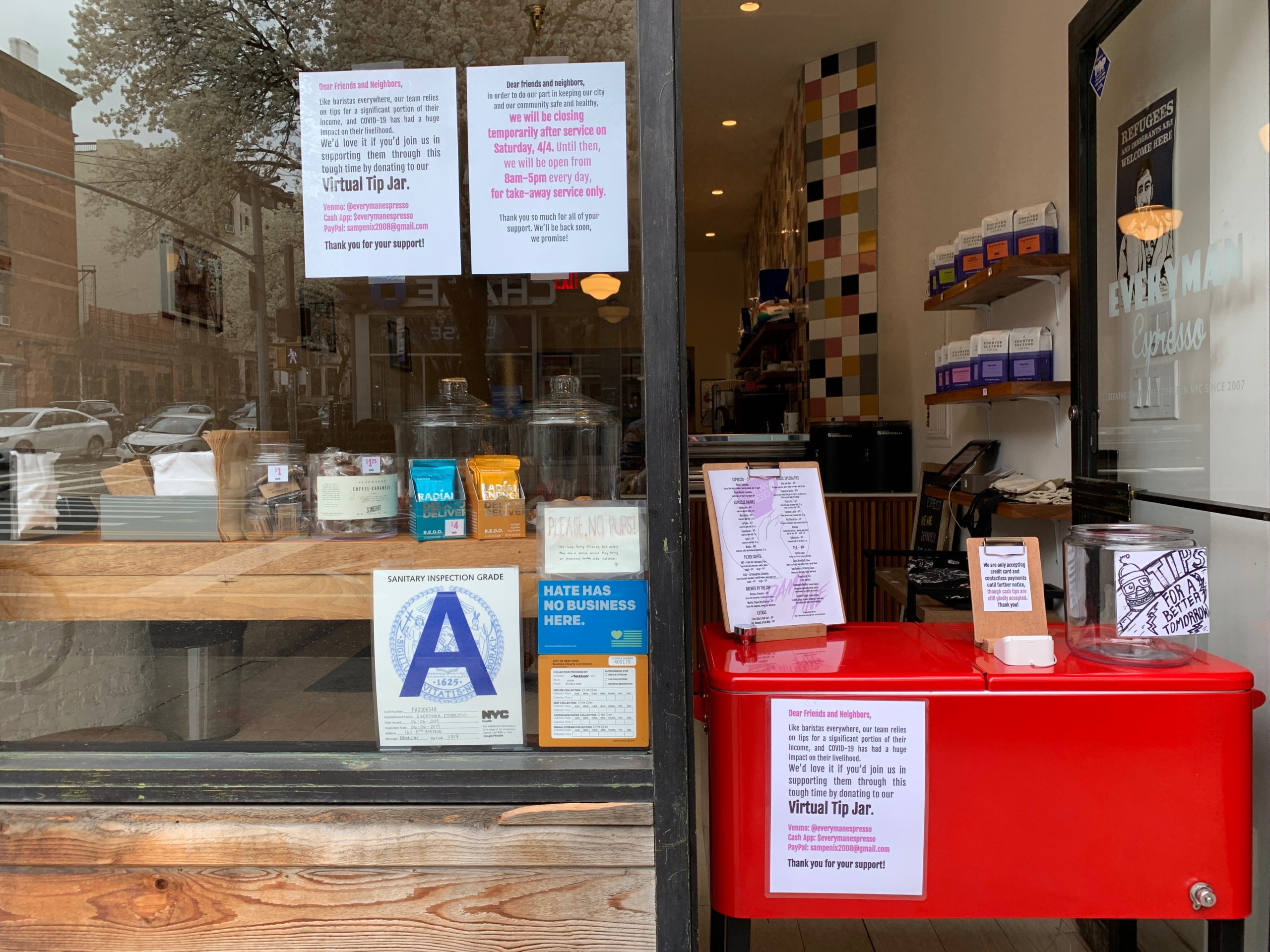
Caffeinating the city that never sleeps, even while it’s on “PAUSE”, is a calling of both passion and economic necessity. As the city shutters and shudders and continually adjusts in response to the fast-growing outbreak of COVID-19, coffee businesses throughout the boroughs have worked to find the solutions right for them and their employees. Some companies have closed completely—well-known players like Ninth Street Espresso, Gregorys Coffee, Joe Coffee Company, Gimme! Coffee, Irving Farm, and Café Grumpy have halted operations at their many stores, while #stillroasting from behind closed doors. (You’ll find many of their virtual tip jars online at Go Fund Bean.)
Deemed an essential service by the city, coffee businesses are operating in takeout capacity only with limited hours, continuing to serve their immediate communities and keep healthy and willing staff at least partially employed. Shops like Sweetleaf, East One Coffee, Variety Coffee Roasters, Coffee Project New York, Café Integral, and Sey Coffee have remained open for to-go service only, at least at some, if not all, of their locations. While many of these businesses were operating pick-up service at time of this article’s publishing, it’s likely that full closures will occur now that stimulus provisions have been announced to for the wage workers most affected.
But so far, the decision to close or remain open has been tied to employee demand, says Variety owner Gavin Compton.
“Most of our efforts and policies have been dictated by the staff that does want to continue working,” says Compton. “We will continue to provide a job even at a loss for those that want the work. Basically the only reason we’re still open is ’cause there are baristas that need and want to work.
“Our Upper East Side location is closed ’cause the entire staff there felt more comfortable not working,” says Compton, who acknowledged that much of his staff requested to be formally terminated. “We provided them with termination letters so they were able to collect unemployment,” he says. “We’re also trying to not have anyone work alone, ’cause that just sucks.”
At Pulley Collective‘s roasting cooperative in Red Hook, owner Steve Mierisch says more than half of the companies who book regular roasting time there have hit the pause button. And many cafes that do retail, but not their own roasting, have chosen to close fully without that additional revenue stream.
Third Rail Coffee, which operates two coffee shops in Manhattan, is one of those. Owner Humberto Ricardo says that it was a staff member who convinced him closing completely was the right thing to do.
“At the height of my anxiety and anger over the existential threat. I was feeling a comment from one of my baristas that really pierced through me,” says Ricardo. “She had dug into the numbers and told me how we were tracking along the lines of Italy’s outbreak. She then stated she wasn’t sure we should ignore the CDC’s recommendations of drastically limiting social interactions etc and serving people that shouldn’t be out in the first place. In other words, we shouldn’t be giving people more reasons to not isolate by being there.”
Though Ricardo was able to offload his remaining coffee to his still-open neighbors at Everyman Espresso, who sold off his 5lb bags of Counter Culture Coffee beans for $50 a pop, Everyman plans to wind down operations by this weekend as well.
“At the beginning, we felt OK about serving with certain barrier measures in place, and making sure that we were doing everything we can to minimize contact between staff and guests and build those physical spaces so there is adequate buffer distance between the folks who are behind the bar and the folks who are ordering coffee,” says Everyman co-owner Sam Lewontin. “As the week went on, it became clear to us that other dangers were not getting any less dangerous, like, we became decreasingly comfortable asking people to commute to work. It’s easy if you can walk to work, it’s less easy if you have to take the train. So we’re now at a point where we’re 100% uncomfortable asking anybody to get on a train for any reason. It’s clear that that hasn’t gotten any safer.”
Those stores choosing to remain open have turned to inventive solutions to add value to the service they already provide to their communities. East Village favorite Abraço, whose menu options have expanded to include takeaway family meals and bottled cocktails. (And yes, their signature olive oil cake and olive shortbread cookie are available for carry-out as well.) Midtown’s Culture Espresso, famous for its chocolate chip cookies, is offering contactless cookie delivery (but not coffee) at this time as well.
Collaborations outside the coffee community have sprung up as well. Joe Coffee Company, which closed its 20 NYC locations the week of March 16, donated remaining coffee and milk reserves to the Bowery Mission and Northwell Health, among others. White Noise Coffee Co. is organizing a fundraiser to provide coffee and food to frontline healthcare workers, and Sam Penix, the other co-owner of Everyman Espresso, is this week launching Fuel Frontlines NYC, a coffee-to-essential-workers initiative inspired by the Restaurant Workers Community Foundation‘s Feed the Frontlines program—just one of many international efforts to get coffee to the essential hospital workers who need it most.
As with all things COVID-19, this story is developing.
Liz Clayton is the associated editor at Sprudge Media Network. Read more Liz Clayton on Sprudge.



 or you know, google map it if you don’t already know… 5# bags for your #stayhome needs. And you needs coffee!! $50 each . . . Also, bit.ly/helpthirdrail . . #covid_19 #stayhome #stayhealthy #staysafe #staystrong #coffee #wholebeancoffee #eastvillage #eastvillagenyc
or you know, google map it if you don’t already know… 5# bags for your #stayhome needs. And you needs coffee!! $50 each . . . Also, bit.ly/helpthirdrail . . #covid_19 #stayhome #stayhealthy #staysafe #staystrong #coffee #wholebeancoffee #eastvillage #eastvillagenyc